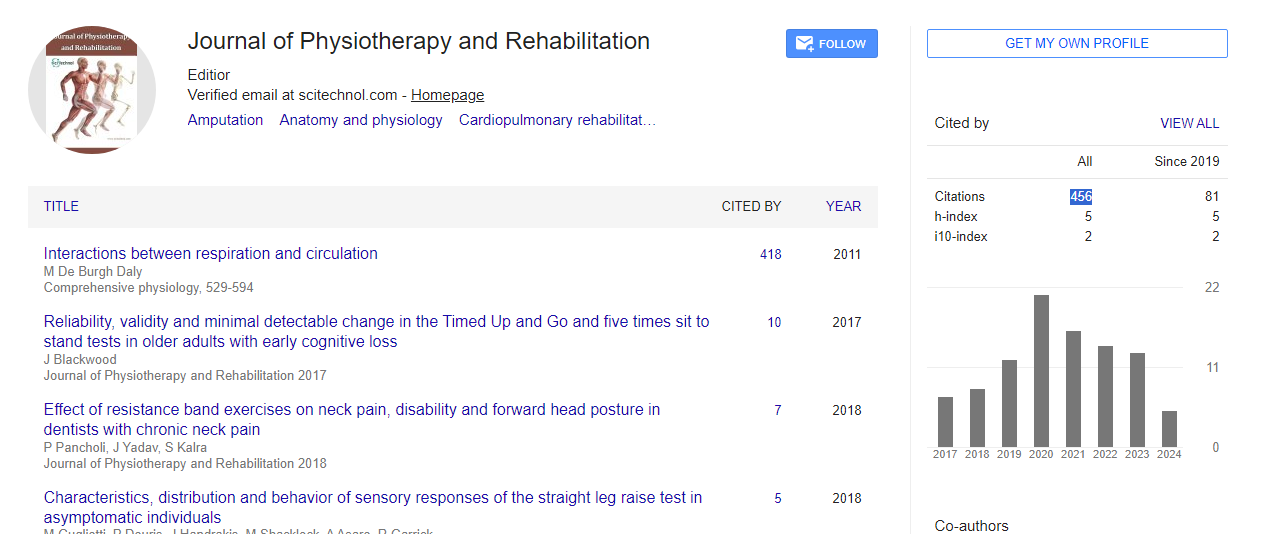Commentary, J Physiother Rehabi Vol: 8 Issue: 2
Comprehensive Healing: Integrating Psychiatric Rehabilitation into Mental Health Care
Can Liu*
1Department of Mental Health Branch, Shanghai Jiao Tong University, Shanghai, China
*Corresponding Author: Can Liu,
Department of Mental Health Branch,
Shanghai Jiao Tong University, Shanghai, China
E-mail: liu@can.cn
Received date: 27 March, 2024, Manuscript No. JPTR-24-135096
Editor assigned date: 29 March, 2024, PreQC No. JPTR-24-135096 (PQ);
Reviewed date: 12 April, 2024, QC No. JPTR-24-135096
Revised date: 19 April, 2024, Manuscript No. JPTR-24-135096 (R);
Published date: 29 April, 2024, DOI: 10.4172/JPTR.1000164.
Citation: Liu C (2024) Comprehensive Healing: Integrating Psychiatric Rehabilitation into Mental Health Care. J Physiother Rehab 8:2.
Description
Psychiatric rehabilitation represents a comprehensive approach to mental health care that focuses on supporting individuals with psychiatric disabilities in their journey towards recovery, independence, and community integration. Unlike traditional medical models that primarily target symptom reduction, psychiatric rehabilitation embraces a broader perspective, addressing the diverse needs of individuals and emphasizing their strengths, goals, and aspirations. This article explores the principles and practices of psychiatric rehabilitation, highlighting its role in promoting comprehensive healing and enhancing the quality of life for individuals living with mental illness.
Psychiatric rehabilitation is grounded in the philosophy of recovery, which recognizes that individuals with mental health challenges have the potential to lead fulfilling and meaningful lives, despite the presence of symptoms or disabilities. Rather than focusing solely on symptom management, psychiatric rehabilitation emphasizes the development of skills, resources, and supports that enable individuals to pursue their personal goals, engage in meaningful activities, and participate fully in society. By fostering hope, empowerment, and selfdetermination, psychiatric rehabilitation promotes holistic healing and resilience in the face of mental illness.
Several core principles underpin psychiatric rehabilitation, guiding the delivery of services and interventions. Person-centeredness is central to psychiatric rehabilitation, emphasizing the importance of tailoring interventions to the unique needs, preferences, and strengths of each individual. Recovery orientation recognizes that recovery is a deeply personal journey characterized by hope, empowerment, and selfdirection, and seeks to support individuals in reclaiming control over their lives and identities. Psychosocial rehabilitation focuses on addressing the social, emotional, and practical challenges associated with mental illness, promoting community integration, and enhancing quality of life.
Psychiatric rehabilitation operates within a multidisciplinary framework, bringing together professionals from various disciplines, including psychiatry, psychology, social work, occupational therapy, and peer support, to provide comprehensive and coordinated care. Integrated treatment plans address the diverse needs of individuals, incorporating a range of services and supports, such as medication management, psychotherapy, vocational training, housing assistance, and social skills training. Collaboration between professionals, individuals, and their families fosters continuity of care, promotes shared decision-making, and maximizes the effectiveness of interventions.
Recovery-oriented practices are central to psychiatric rehabilitation, emphasizing the importance of hope, self-determination, and empowerment in the recovery process. Psychiatric rehabilitation practitioners employ a strengths-based approach, focusing on identifying and building upon individuals' unique abilities, talents, and resources. Goal setting and action planning facilitate the achievement of personal goals and milestones, empowering individuals to take ownership of their recovery journey and make informed choices about their care and treatment.
Skills training and psychoeducation are integral components of psychiatric rehabilitation, equipping individuals with the knowledge, resources, and coping strategies needed to manage their symptoms and navigate daily life. Psychoeducational programs provide information about mental health conditions, treatment options, medication management, and self-care techniques, empowering individuals to make informed decisions about their health and well-being. Skills training programs focus on building practical skills in areas such as communication, problem-solving, stress management, and social interaction, enhancing individuals' abilities to function effectively in various life domains.
Employment and vocational rehabilitation are key components of psychiatric rehabilitation, enabling individuals to achieve financial independence, pursue meaningful work, and contribute to society. Supported employment programs assist individuals with mental health challenges in finding and maintaining competitive employment, providing job coaching, skills training, and ongoing support in the workplace. Vocational rehabilitation services help individuals identify their strengths, interests, and career goals, explore educational and vocational opportunities, and develop a plan for achieving their employment objectives.
Conclusion
Psychiatric rehabilitation represents a comprehensive approach to mental health care that prioritizes the recovery, empowerment, and well-being of individuals living with mental illness. By embracing principles of person-centeredness, recovery orientation, and psychosocial rehabilitation, psychiatric rehabilitation promotes comprehensive healing and resilience, enabling individuals to reclaim their lives, pursue their goals, and participate fully in society.
 Spanish
Spanish  Chinese
Chinese  Russian
Russian  German
German  French
French  Japanese
Japanese  Portuguese
Portuguese  Hindi
Hindi 